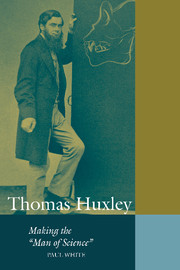Book contents
- Frontmatter
- Contents
- Illustrations
- Acknowledgments
- Introduction
- 1 Science at Home
- 2 Gentlemen of Science? Debates over Manners and Institutions
- 3 Science as Culture
- 4 The Worship of Science
- 5 “Darkest England”: Science and Labor in the 1880s and 1890s
- Conclusion: The End of the “Man of Science”
- Bibliography
- Index
5 - “Darkest England”: Science and Labor in the 1880s and 1890s
Published online by Cambridge University Press: 25 June 2009
- Frontmatter
- Contents
- Illustrations
- Acknowledgments
- Introduction
- 1 Science at Home
- 2 Gentlemen of Science? Debates over Manners and Institutions
- 3 Science as Culture
- 4 The Worship of Science
- 5 “Darkest England”: Science and Labor in the 1880s and 1890s
- Conclusion: The End of the “Man of Science”
- Bibliography
- Index
Summary
In tens of thousands of poor homes, Huxley's name must be [that of] one who was the mere tool and instrument of a prevalent orthodoxy – a despotism personified.
– Daylight, 13 July 1895Chapters 3 and 4 have shown how Huxley drew on literary and religious models to shape scientific identity, and how he contended and cooperated with men of letters and clergymen in the reform of curricula in public schools and universities, and in new elementary classrooms supported and administered by the state. The public controversies in which Huxley engaged with other leading social figures took place before a variety of audiences who often had quite different notions of what science, literature, and religion should be, and who did not merely defer to learned men. Thus the meaning of the cultural practices in which such men engaged, the values that they attached to their work, and their self-definitions were in large part dependent on the views of the people whom they sought to educate. The “cultural authority” for which learned groups contended was itself in question and could be acquired only by meeting the expectations of various publics. Men of science were called upon by their patrons in government and industry to be meritocratic and practical, while many of their audiences and publishers expected rational amusement, moral didacticism, and a display of specially endowed powers of intellect.
- Type
- Chapter
- Information
- Thomas HuxleyMaking the 'Man of Science', pp. 135 - 169Publisher: Cambridge University PressPrint publication year: 2002



